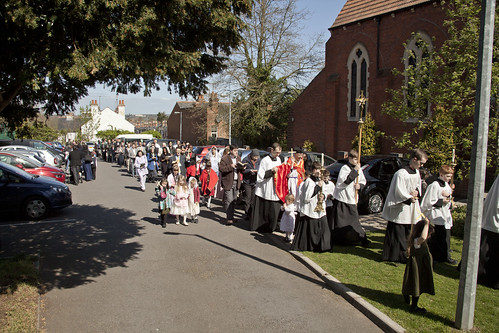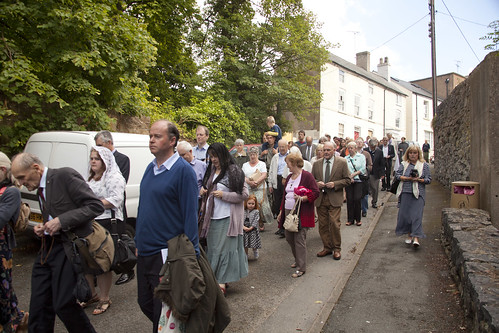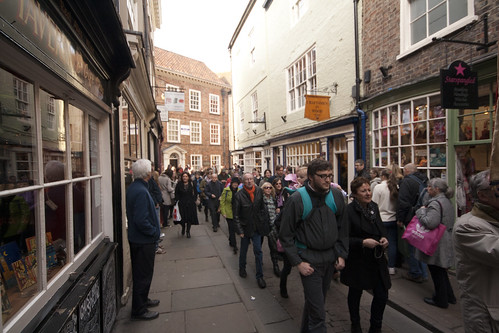 |
| Palm Sunday procession with the FSSP in St William of York, Reading |
------------
Why the Extraordinary Form should be promoted: an open
letter to the Bishops of England and Wales
Looking back at the Latin Mass Society’s fifty years,
we must acknowledge our gratitude for the almost complete disappearance of the
hostility towards the Extraordinary Form (EF) which, though never universal,
was once widespread enough to be both a cross for our supporters and a serious
impediment to our activities. In this positive development you, our Bishops in
England and Wales, have played a crucial role. The question arises: Is there
any reason for those with the care of souls to go beyond toleration, and
actually to facilitate or promote this form of the Mass?
Pope Benedict gave us a number of reasons why the EF
should be more widely celebrated, in the ‘Letter to Bishops’ accompanying his
2007 motu proprio Summorum Pontificum.
One is the spiritual needs of those who have been asking for it for many years.
He refuses to categorise these Catholics as unreasonable, or theologically
misguided; he tells that in his own experience they have been ‘individuals
totally rooted in the faith of the Church’.
Related to this is the attraction felt by new
generations of Catholics.
‘[I]t
has clearly been demonstrated that young persons too have discovered this
liturgical form, felt its attraction and found in it a form of encounter with
the Mystery of the Most Holy Eucharist, particularly suited to them.’
This phenomenon has been seen in England and Wales
also, notably with active ‘Juventutem’ groups in London and several other
cities, the participation of young people from England and Wales in the annual
Chartres Pilgrimage and our own walking pilgrimage to Walsingham, and many vocations
to the traditional priestly orders. There are currently a dozen young men from
England and Wales in training with the FSSP, the ICKSP, and the F.SS.R..
Another reason Pope Benedict gave is the matter of
healing a rift in the Church’s own historical self-understanding.
‘What
earlier generations held as sacred, remains sacred and great for us too, and it
cannot be all of a sudden entirely forbidden or even considered harmful. It behoves all of us to preserve the riches
which have developed in the Church’s faith and prayer, and to give them their
proper place.’
To repudiate such an essential part of the Church’s
past, is, as Cardinal Ratzinger had written earlier in The Spirit of the Liturgy, ‘calls her very being in question’.
The good effects Pope Benedict expected to see depend
upon the EF being widely available
and known. We often hear that there is ‘no demand’ for the ancient Mass, but in
truth there can be no ‘demand’ for a ‘product’ which is completely unknown.
What we do know is that many priests have, over a few years, seen congregations
appear from nowhere for something which few of their parishioners previously
knew existed. In such places the EF has drawn back the lapsed, stimulated conversions,
and enriched the spiritual lives of many. This, surely, is a sufficient reason
to make it available.
There is a worry, however, mentioned by Pope Benedict,
which has also been referred to by Pope Francis: Pope Francis’ calls it the
danger of the ‘ideologisation’ of the Vetus
Ordo. The worry is that this Form of the Mass becomes associated with
certain unfortunate ideas and attitudes, and becomes a source of division in
the Church.
 |
| Pilgrims on the LMS Pilgrimage to Holywell, Wales, in honour of St Winefride |
Nevertheless, it is well to consider the relationship
between a perceived ‘ideologisation’ and effective marginalisation. As Cardinal
Ratzinger so memorably expressed it at the end of the last century:
Anyone
who nowadays advocates the continuing existence of this liturgy or takes part
in it is treated like a leper; all tolerance ends here.
Sociologists tell us that marginalised groups
typically become radicalised, and attract new members who are already marginal,
perhaps for unrelated reasons. I believe that we have resisted these tendencies
very successfully for the fifty years of the Latin Mass Society’s existence.
Those who have any worries in this regard, however, will be able to see the
remedy. Problems created by marginalisation will be cured by ending the marginalisation.
Next, let us consider the relationship between ideologisation
and liturgy itself. There are, sadly, many attempts to use the liturgy for
ideological purposes today: that is, to advance an agenda at odds with the
teaching of the Church. The clearest examples are liturgical abuses aiming to
undermine reverence for the Blessed Sacrament, or a proper understanding of the
ordained priesthood. The Extraordinary Form is protected from this kind of
liturgical ‘deformation’ by the liturgical discipline it demands, and, almost
always, receives.
Finally, let us consider the social aspect of the
liturgy: the community which forms around particular celebrations. It is a fact
that there exists an unfortunate tendency for different Sunday Masses within a
parish, and between neighbouring parishes, to attract distinct social or
educational groups. The phenomenon, well-intentioned as it is, of ‘family
Masses’, ‘student Masses’, and Masses for specific language groups, exacerbates
this. The possibility of ‘divisiveness’ in this context is very real.
The Extraordinary Form, by contrast, has a very clear
record of attracting a diverse range of people. The young, the old, the highly
educated, and the less highly educated, single people and families, people from
all walks of life, and from all social and ethnic backgrounds, happily find a
place in well-established EF congregations.
I would like to
invite each of you, our Bishops in England and Wales, to visit the largest such
congregations in your dioceses and see for yourselves.
You will see, I hope, that this is not a source of division, but a
demonstration of a truly Catholic unity in diversity.
You will, I believe, find Catholics dedicated to their
priests, to their parishes, and to their dioceses; Catholics docile to the
teaching of the Church; Catholics eager to benefit from the riches of our
intellectual and artistic patrimony; Catholics ready to evangelise by word and
example, and involved in all sorts of charitable and educational work;
Catholics ready to support you, their bishops, in the challenges you face from
an increasingly unfriendly secular society.
 |
| Pilgims on the LMS York Pilgrimage, the procession past the shrine to St Margaret Clitherow |
These Catholics do not want to cause division or to be
exclusive. They want nothing more than to be regarded, not as orphans or
houseguests, but as your spiritual children.
Joseph Shaw
Chairman, the Latin Mass Society
Support the work of the LMS by becoming an 'Anniversary Supporter'.
I have twice written to my bishop (Rt Rev Seamus Cunningham) regarding first his pastoral letter which seemed to say that regardless of the massive slump in priestly vocations our diocese seems in fine shape.
ReplyDeleteMy second letter followed after I approached a newly ordained priest to ask if he would consider learning to celebrate the EF Mass. His response was that he could not as he had no Latin. My query to the bishop was to ask how a newly ordained priest who was trained in a UK seminary could have no Latin when Pope St John Paul II had mandated that they should.
I received no response to either question, not even an acknowledgement.
My understanding is that Latin is merely an option at Wonersh if even that. I stand to be corrected. Latin used to be a requirement for matriculation at Oxford but that has long gone. A pity. In the law there seems to be a novel prejudice against latin tags and again this is rather sad as such are very useful.
ReplyDeleteWhy would a priest need to know Latin?? I don't know Latin but I know how to read a missal.
ReplyDeleteThe lms mob should become sedevacantist and adopt the sedevacantist position. The Una Cum mass is sinful and bad for the faith because it espouses support for a public heretic in Bergoglio.
ReplyDeleteYou don't know what the term 'public heretic' means. Go look it up.
DeleteI've been told that sede seminaries don't have courses on canon law, or works of canon law in their libraries. This is why.